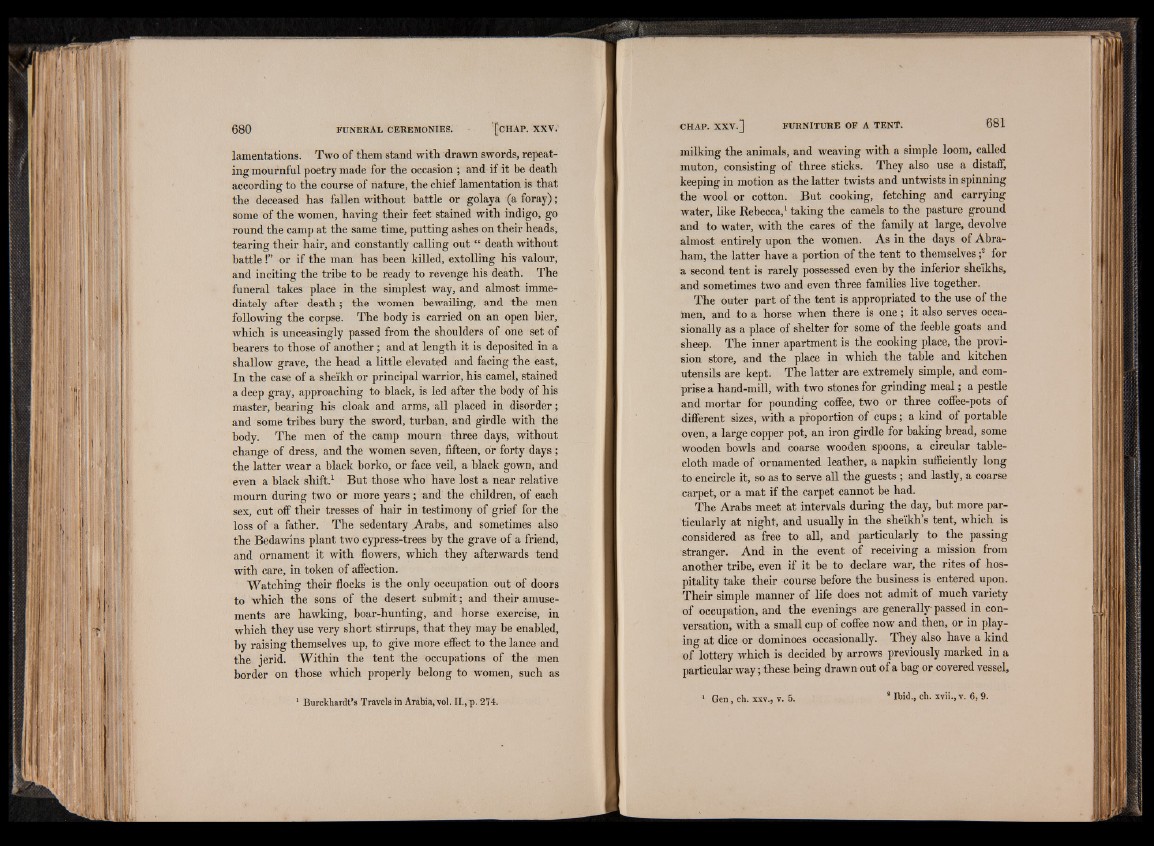
lamentations. Two of them stand with drawn swords, repeating
mournful poetry made for the occasion ; and if it be death
according to the course of nature, the chief lamentation is that
the deceased has fallen without battle or golaya (a foray);
some of the women, having their feet stained with indigo, go
round the camp at the same time, putting ashes on their heads,
tearing their hair, and constantly calling out “ death without
battle!” or if the man has been killed, extolling his valour,
and inciting the tribe to be ready to revenge his death. The
funeral takes place in the simplest way, and almost immediately
after death; the women bewailing, and the men
following the corpse. The body is carried on an open bier,
which is unceasingly passed from the shoulders of one set of
bearers to those of another; and at length it is deposited in a
shallow grave, the head a little elevated and facing the east,
In the case of a sheikh or principal warrior, his camel, stained
a deep gray, approaching to black, is led after the body of his
master, bearing his cloak and arms, all placed in disorder;
and some tribes bury the sword, turban, and girdle with the
body. The men of the camp mourn three days, without
change of dress, and the women seven, fifteen, or forty days f
the latter wear a black borko, or face veil, a black gown, and
even a black shift.1 But those who have lost a near relative
mourn during two or more years ; and the children, of each
sex, cut off their tresses of hair in testimony of grief for the
loss of a father. The sedentary .Arabs, and sometimes also
the Bedawins plant two cypress-trees by the grave of a friend,
and ornament it with flowers, which they afterwards tend
with care, in token of affection.
Watching their flocks is the only occupation out of doors
to which the sons of the desert submit; and their amusements
are hawking, boar-hunting, and horse exercise, in
which they use very short stirrups, that they may be enabled,
by raising themselves up, to give more effect to the lance and
the jerid. Within the tent the occupations of the men
border on those which properly belong to women, such as
milking the animals, and weaving with a simple loom, called
muton, consisting of three sticks. They also use a distaff,
keeping in motion as the latter twists and untwists in spinning
the wool or cotton. But cooking, fetching and carrying
water, like Rebecca,1 taking the camels to the pasture ground
and to water, with the cares of the family at large, devolve
almost entirely upon the women. As in the days of Abraham,
the latter have a portion of the tent to themselves f for
a second tent is rarely possessed even by the inferior sheikhs,
and sometimes two and even three families live together.
The outer part of the tent is appropriated to the use of the
men, and to a horse when there is one ; it also serves occasionally
as a place of shelter for some of the feeble goats and
sheep. The inner apartment is the cooking place, the provision
store, and the place in which the table and kitchen
utensils are kept. The latter are extremely simple, and comprise
a hand-mill, with two stones for grinding meal; a pestle
and mortar for pounding coffee, two or three coffee-pots of
different sizes, with a proportion of cups; a kind of portable
oven, a large copper pot, an iron girdle for baking bread, some
wooden bowls and coarse wooden spoons, a circular tablecloth
made of ornamented leather, a napkin sufficiently long
to encircle it, so as to serve all the guests ; and lastly, a coarse
carpet, or a mat if the carpet cannot be had.
The Arabs meet at intervals during the day, but more particularly
at night, and usually in the sheikh s tent, which is
considered as free to all, and particularly to the passing
stranger. And in the event of receiving a mission from
another tribe, even if it be to declare war, the rites of hospitality
take their course before the business is entered upon.
Their simple manner of life does not admit of much variety
of occupation, and the evenings are generally-passed in conversation,
with a small cup of coffee now and then, or in playing
at dice or dominoes occasionally. They also have a kind
of lottery which is decided by arrows previously marked in a
particular way; these being drawn out of a bag or covered vessel,